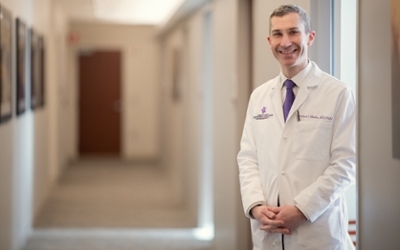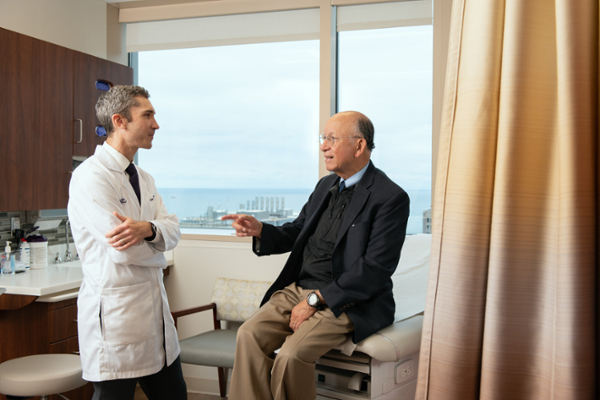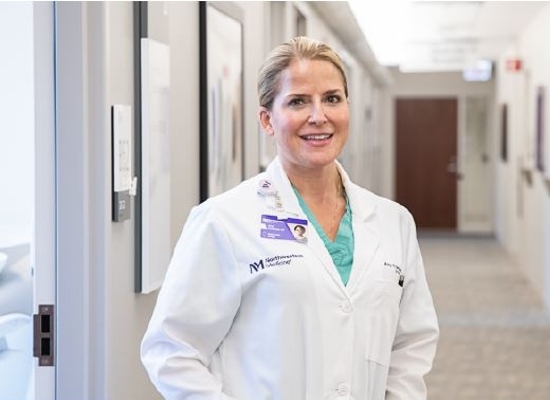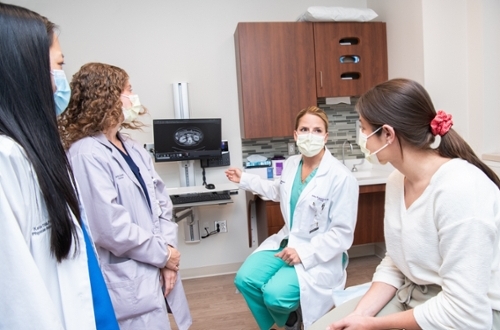Patient Stories
The Northwestern Department of Urology provides treatment for urological conditions of all kinds and is committed to providing the highest quality of patient care. Check out our patient stories to hear what real patients have to say about their experience at Northwestern Urology.
Why me? Why do I have this problem? What should I do?”
Health issues often raise many questions that deserve answers. And when none are close at hand, innovative research offers the best hope for effective solutions.
At Northwestern Medicine Urology, patient questions inspire the work of our physicians and scientists. From bedside to bench and back again, our researchers seek to develop therapies and search for cures that tangibly impact the lives of real people.
Advancing bladder cancer research

Joshua Meeks, MD, PhD
Eight years ago, the detection of bladder cancer during a routine preoperative CT scan changed Ann Mardon’s life in an instant. Instead of preparing for bladder prolapse surgery at Northwestern Medicine, this grandmother of three had her bladder removed entirely and a neobladder constructed. The closest substitute to a normal bladder, the neobladder allowed Ann, now 71, to continue her full and active lifestyle.
People who smoke are three times more likely to develop bladder cancer than those who don’t smoke. However, Ann had never smoked, and she also didn’t have any other high-risk factors. While very grateful for the lifesaving care she received from urologic surgeon Joshua Meeks, MD, PhD, Ann sometimes wonders why this happened to her. “I really don’t know the reason why I got this cancer,” she says.
As director of the Northwestern Medicine Urology Bladder Cancer Research program, Dr. Meeks works to answer questions like Ann’s and those of other patients. The Meeks Laboratory studies the disease from many angles to achieve one goal: to cure urothelial carcinoma.
Delving into the effect of genetic mutations on immune response, researchers look for new therapies to attack hard-to-treat metastatic bladder cancer. Identifying precise biomarkers using specific patient tumor cells, they seek to improve treatment to better preserve the bladder and optimize outcomes. Tackling gender differences in bladder cancer, the team hopes to better understand why the disease is more aggressive in women even though men are more than four times more likely to develop the disease. Many unknowns about bladder cancer remain, which motivates the Meeks team to learn more.

“Research begins when clinical medicine stops,” says Dr. Meeks. “We take the insight we gain from our patients and frame their questions in ways that we can address them in the laboratory and through clinical trials to impact care.”
Further advancing Dr. Meeks’ unique focus on bladder cancer in women, Northwestern Medicine offers one of the country’s only bladder support programs specifically for women. The all-female group attracts participants to Chicago from as far as away as Alaska, Texas and Washington, DC.
“It’s an amazing gathering of women, who all have questions,” says Ann, who helps lead the group. “We listen and we share our experiences so that women with bladder cancer can be heard and know they are not alone.”
Revolutionizing treatment for BPH

Amy Krambeck, MD
During the 2021 holiday season, 59-year-old Will* ended up in the hospital near his home in the Chicago suburbs. Unable to urinate, he required immediate catharization to treat the urinary tract symptoms caused by his very enlarged prostate.
Treatment for severe benign prostatic hyperplasia (BPH) often calls for open surgery that could entail a long hospitalization, blood transfusions and weeks of catheterization. Fortunately, Will’s urologist recommended holmium laser enucleation of the prostate (HoLEP), a minimally invasive laser procedure performed by trained and experienced experts only found at academic medical centers like Northwestern Memorial Hospital. HoLEP is a noninvasive same-day surgery that includes catheter removal. It offered Will everything that he could ask for in surgically eliminating his urinary obstruction due to BPH.
“I was concerned about how I would heal if I had traditional surgery,” says Will. “HoLEP is noninvasive and has a high success rate in treating BPH. I also didn’t want anything in my life that involved a catheter ever again.” Requiring no incisions, HoLEP uses a surgical holmium laser to cut and remove bulky prostate tissue blocking the flow of urine. One of the first in Illinois to perform the unique procedure, Amy Krambeck, MD, chief of the Northwestern Medicine Division of Endourology and Stone Disease, performs all HoLEP procedures at Northwestern Medicine and sees patients with BPH from all over the world.
Dr. Krambeck also conducts research to further advance this now gold-standard treatment for BPH. In clinical studies, her team has collaborated with the leading HoLEP laser developer to alter the pulse delivery system to permit real-time adjustments to optimize treatment. This recent work has resulted in less bleeding for patients undergoing the procedure.
*This patient’s name has been changed to protect his privacy.

“HoLEP has transformed BPH surgical treatment for patients with very enlarged prostates, but is not offered widely because few places have the highly trained specialists required to perform HoLEP,” says Dr. Krambeck, who worked with the Israel-based manufacturer of the first FDA-approved holmium laser to develop the new laser. This summer, Dr. Krambeck began leading an online, on-demand “HoLEP University” to help make HoLEP training more readily available to urologists anywhere. “We are hoping the training will facilitate more comprehensive learning with a faster learning curve.”
Transforming care through innovation
Today’s modern approach to scientific discovery involves patients as partners. No longer is research only done “to” or “for” patients. At Northwestern Medicine Urology, research is done “with” them—every step of the way.
Conducting studies motivated by real people like Ann and Will ensures we always ask: “How can we provide even better care to our patients?”
That may be the question that matters most in advancing biomedical research, and one that our clinicians and scientists ask each and every day